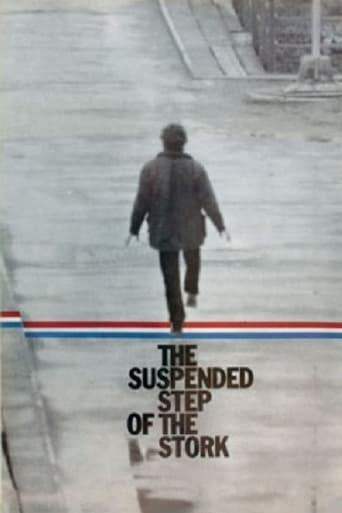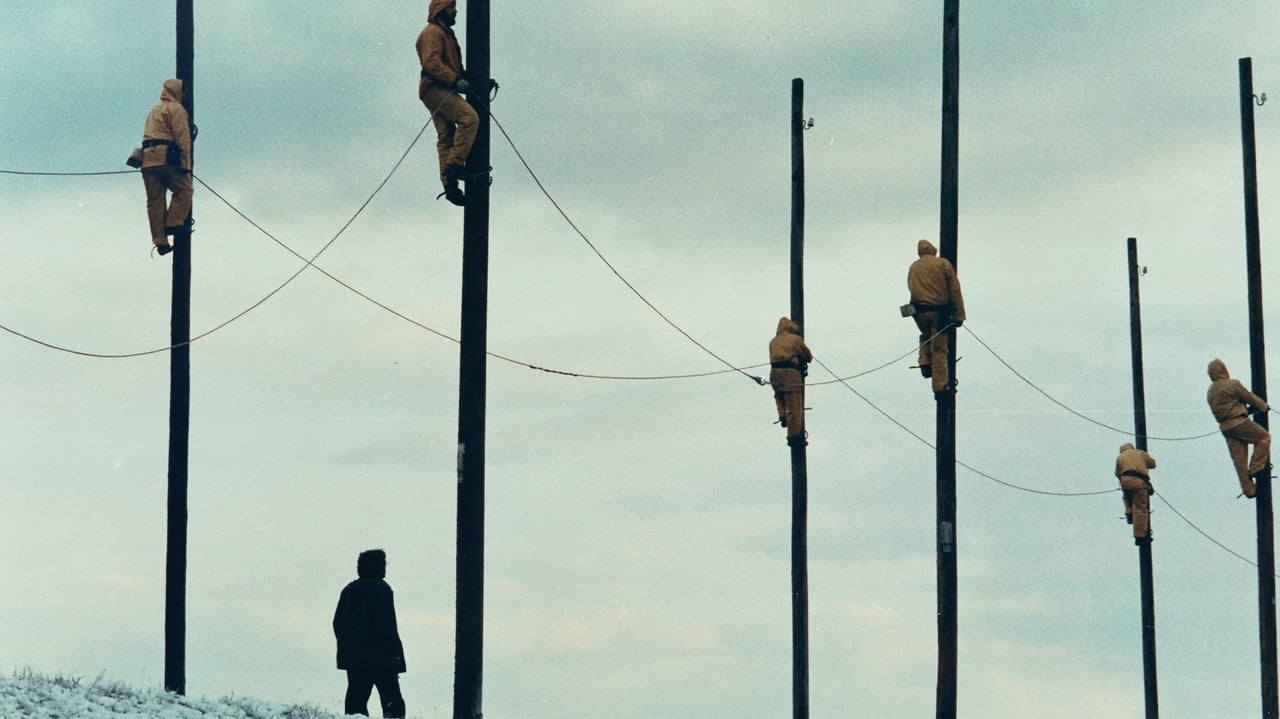a-tsitsos
Our house is your house. Our house ... We passed the borders and we are still here. But how many borders must we pass to go to our home?This particular phrase from the unforgettable Theo Angelopoulo's film sums up the whole meaning of the film and the Trilogy of borders.Alexandros a TV reporter armed with the energy of the youth seeks a missing politician in a border town.The town is full of people from many ethnicities among them there is the politician(Marcelo Mastoioanni).His character a talented writer and politician disappears mysteriously and leaves everything behind to seek the very place which will make him happy,he seeks a home.The film title is a reference on the fatal step that people may take to cross the borders literally and not,the thoughts in that hour and danger of doing the step or fending off from it.Mastoioanni's character for another time in the end of the film takes the step of the stork and goes in another journey crossing borders once more.One of the best movies of Theo Angelopoulos.Unlikely from the most of his films,here the dialog serves the plot smoothly.The actors marry words with emotions.The beautiful landscape photography makes the movie even more beautiful.Although as all Angelopoulos movies the action is reduced.The mainstream viewer might get bored as it is a cult film with deep emotional scenes.Humanism dominates as people are the center of the films's axis.People have to overcome all the borders in their way even if they are guarded from soldiers.The movie with a simple plot delivers deep messages who change everyones way of thinking.All in all one of the greatest Greek films of the century.Highlight of the film: The Suspended Step of the Stork on the board line of Evros and the odd wedding across the river.
Cosmoeticadotcom
The screenplay was co-written by Angelopoulos, Tonino Guerra, Thanassis Valtinos, and Petros Markaris, and the stylistic influence of Guerra, as usual, reigns supreme, and fortunately so. The music, by Angelopoulos' long time collaborator, Eleni Karaindrou, is, as usual, superb. While Angelopoulos films do not use music as innovatively as Werner Herzog's films, nor as pop culturally as Martin Scorsese's films, few films marry image and emotion with sound and well. That stated. Few filmmakers can use the absence of sound as effectively, either. And, of course, there is the Angelopoulos long take, provided by cinematographers Giorgos Arvanitis and Andreas Sinanos. Whereas the long takes of an Antonioni are wrought with tension, and those of a Bela Tarr are often elliptical in space and feeling, Angelopoulos's are purely emotional, and often use symbolism. A good example of this comes in the final scene, after the reporter is done with the refugee, the town, the border, and the colonel. He walks along the river, past telephone workers garbed in yellow raincoats, as they ascend poles. There seem to be a couple dozen of the workers, yet few move. It is as if they are ancient stylites looking out over the rift that they can do nothing to heal. In fact, their very muteness and lack of motion make them even more impotent; as if guidons to some cause that simply is, but cannot affect, or musical notations sans sound. And this is reflected in the very real frustration portrayed by the reporter (and the actor who portrays him, Gregory Karr). Another scene is a long tracking shot of boxcars where the Albanian refugees live. An accordion plays a folk song, and as the camera tracks it feels as if the hapless people are moving (and the deliberate iconography of the World War Two Nazi railroads to death camps lends a sense of hopelessness to their plight). Except, it is an illusion of motion, as the refugees are stuck in their plights, each boxcar with its own slack-jawed prisoners mutely gazing out at the cosmos. The riverside wedding scene, also done virtually wordlessly, is another example of Angelopoulos's mastery of cinema, and is a key scene, for similar riverside scenes figure prominently in his earlier Landscape In The Mist and later Trilogy: The Weeping Meadow. The scenes in these films are so similar that one almost feels they are prefigurations, or connecting devices between the films, as if the Angelopoulos canon is one extended, ongoing film, not separate works of art. The acting, done from a distance, and using the whole body, still conveys powerful emotions, and is lacking any musical score- only the sounds of nature (the wind, river, etc.) abound. I cannot recall any Hollywood film that would do such a thing- cast big name stars like Mastroianni and Moreau, and then not take 'advantage' (in the traditional sense) of their 'star power.' But it works, nonetheless, for this is a film that is so well wrought that, in essence, any actors could have stepped in and done a good job (recall my claim of being on autopilot; but in the best sense), for the lack of emoting via facial expressions, and the deliberate interchangeability of characters and actors is another element of the film that aids its universality.But, above all, all of these techniques are simply variations on the obliquity of moment I mentioned earlier. A seemingly familiar scene is set, but then plays out slightly differently than expected. We visually are comforted, but the disjunction between the expected and the result lingers subconsciously, provoking a rewatch of the film, at most, and a desire to understand, minimally. A final example comes in a scene midway through the film, and one that is an astonishing long take. After some ethnic tensions in the town, between refugees, a man's body is found hanged, dangling from the end of a crane. The colonel shows this to the reporter, and then orders the cadaver lowered to the tracks. As it slowly descends, we see women in babushkas wailing in the background. They run toward the figure, and we think that they are wailing for it. As the body comes to earth, the camera leaves the scene, and follows the reporter, as a train pulls in slightly farther down the tracks. He is there to greet the Greek politician's wife, before she is to 'confront' the Albanian refugee. The camera follows him, turns 180° degrees, then before following him through one side of the train and out the other, we glimpse the pack of babushkas swarming on the corpse. It seems like they are predators on carrion, stripping it of possessions. What we thought was a scene of grief seems to have devolved into a scene of rapacity. But, this is all 'minor,' for the camera is more interested in the reporter and his quest. Still, that the camera never breaks away from the reporter, and all this plays out in the background, is a virtuoso achievement in technical, emotional, and narrative terms.Even the film's title, The Suspended Step Of The Stork, is oblique. Yes, there is the obvious reference to the way the colonel and reporter both hold their legs up over the border line, but it can also be referring to the suspended life of the Greek politician- a man whose life seemed a thing of beauty and hope for the Greeks, yet is frozen in the diegetic history of the film- or not?, if one believes that the refugee really was the politician. Fortunately, such a freeze does not affect the viewer, for The Suspended Step Of The Stork is a masterpiece of a film. True, many video game style Hollywood action and adventure film addicts will not 'get it,' but who really gives a damn what such folk think? They are the unobliqued in life, and this film shows how little such really matters, in the long run or short.
alexx668
Question: how does a bourgeois director treat a subject like immigration ? Answer: by turning it into an existential alienation parable.Yes, we're back in the early 90s, just after the disintegration of the Eastern block and the subsequent flooding of immigrants in the European Union, and what better way to deal with the subject than making a film about an existentially alienated middle-class journalist, an existentially alienated upper-class politician, his existentially alienated rich wife, and so on.In the background, immigrants are asking for political asylum in an unnamed Greek village near the borders. I guess that way Angelopoulos can show some social awareness, while dealing with the existentially troubled upper-classes. I mean honestly, the scene where some top-ranking army-officer curses his destiny cause he sent his daughter to study in London is enough to make you puke.Anyway, it can't be that bad, Angelopoulos is a master of the cinematic art after all, right ? Wrong. It's at this point when his mannerisms start getting too artificial, sort of like a filtered image in Photoshop. His usual tricks show up: there are blurred windows, blurred lights, a weird wedding, a walk by the river-shore, and people with yellow water-coats. Also Mastroianni breaks new ground for most sleepwalking performance ever. Avoid really. Go for his early films.
Mouzafphaerre HB
A most recommendable masterpiece, not only for the underlying themes of the story but also for the unmatchably brilliant and ingenious picture work of Angelopoulos, not to mention the acting of giants, Mastroianni and Moreau, and the remarkable character play by Ilias Logothethis. Gregory Karr's performance may seem overshadowed by his "tough" partners' at first stance but in fact he perfectly plays his character, which is revealed in his very last scene with the girl (Khrysikou) and the man (Mastroianni), albeit hinted beforehand. (Hence the spoiler.)Get your expectations straight! It's an "art movie" in whatever meaning that phrase has to offer and requires attention. Not for spending free time, but for watching an artwork with the necessary concentration as in reading a book or attending a concert. Due to the overall photographic style, large screen viewing is recommended.Dialogues are used sparingly. But the film includes -in addition to the standard Greek and English speaking- fragments spoken in Albanian, Kurdish and Turkish, which will be attractive for those who are charmed by the beauty in hearing various languages.


 AD
AD


